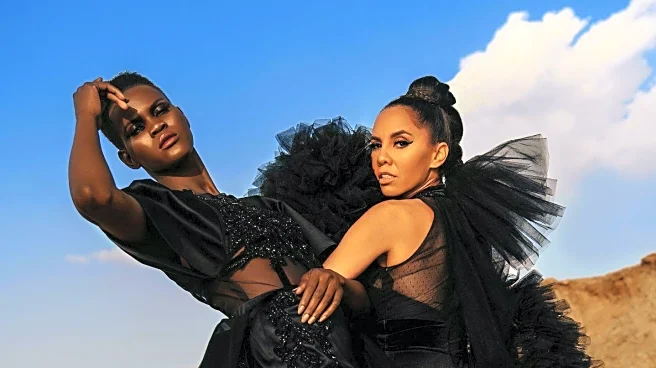What is the story about?
What's Happening?
Models Alex Consani and Anok Yai have publicly addressed rumors of a feud following Consani's win as Model of the Year at the 2024 Fashion Awards in London. The speculation began when Yai congratulated Consani on social media but later expressed to the British Fashion Council that she no longer wanted the award. This led to widespread rumors of a conflict between the two, exacerbated by online discussions that included elements of racism and transphobia. Both models have clarified that there is no feud and emphasized their close friendship, stating that they have supported each other throughout their careers. They are using this opportunity to highlight issues of tokenism and representation within the fashion industry, aiming to shift the focus from personal conflicts to broader industry challenges.
Why It's Important?
The clarification from Consani and Yai is significant as it addresses the harmful narratives often perpetuated in the fashion industry, particularly those involving race and identity. By speaking out, they are challenging the industry's tendency to pit individuals against each other based on superficial differences. Their stance brings attention to the need for greater representation and support for marginalized groups within fashion. This dialogue is crucial for fostering a more inclusive environment that values diversity and equity. The models' actions could inspire other industry figures to address similar issues, potentially leading to systemic changes in how the fashion world operates and perceives diversity.
What's Next?
Consani and Yai plan to continue using their platforms to advocate for change within the fashion industry. They aim to engage in more discussions about tokenism and representation, hoping to influence industry standards and practices. As they move forward, their focus will likely remain on promoting inclusivity and supporting emerging models from diverse backgrounds. The industry may see increased pressure to address these issues, potentially leading to new initiatives or policies that prioritize diversity and equity. Stakeholders such as fashion brands, agencies, and councils may need to respond to these calls for change, possibly reshaping the industry's approach to representation.
Beyond the Headlines
The situation highlights the broader cultural and ethical dimensions of representation in fashion. The industry's historical challenges with diversity are underscored by the models' experiences, pointing to a need for ongoing dialogue and reform. The incident also reflects societal tendencies to create conflict where none exists, often fueled by biases and stereotypes. Addressing these underlying issues requires a collective effort from industry leaders, media, and consumers to foster a more respectful and inclusive environment. Long-term, this could lead to a shift in how fashion narratives are constructed and consumed, promoting a culture of support rather than division.














